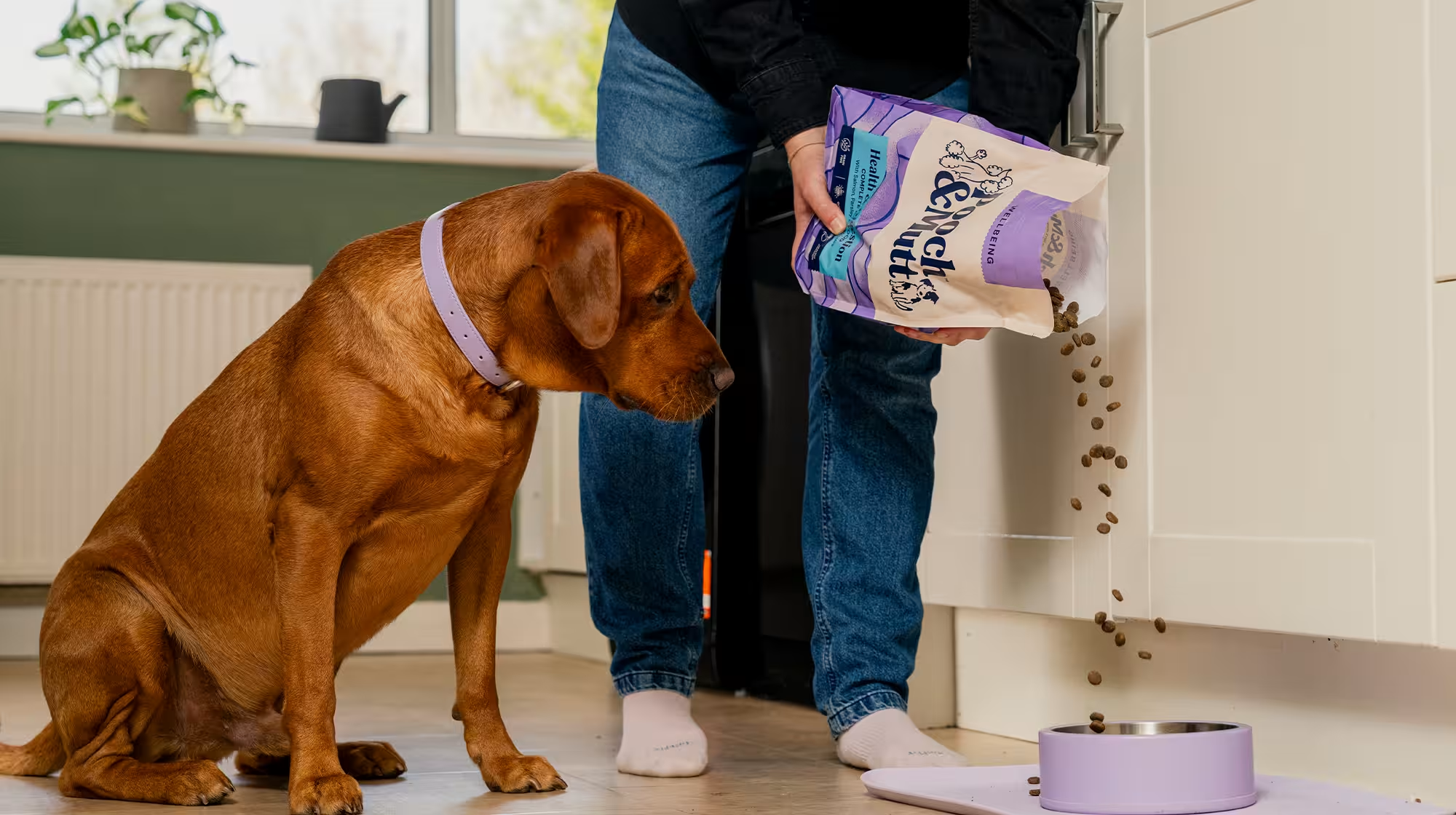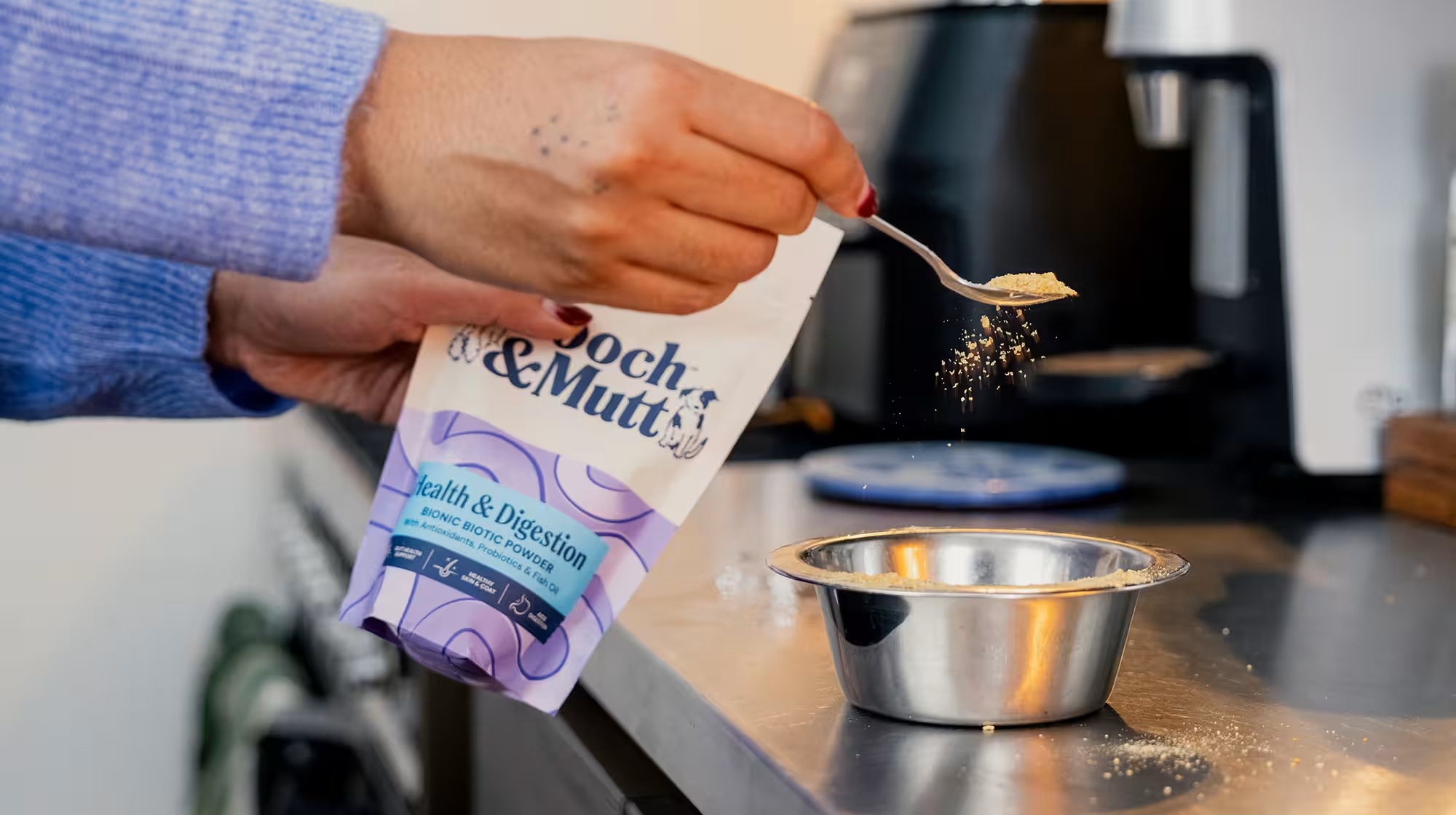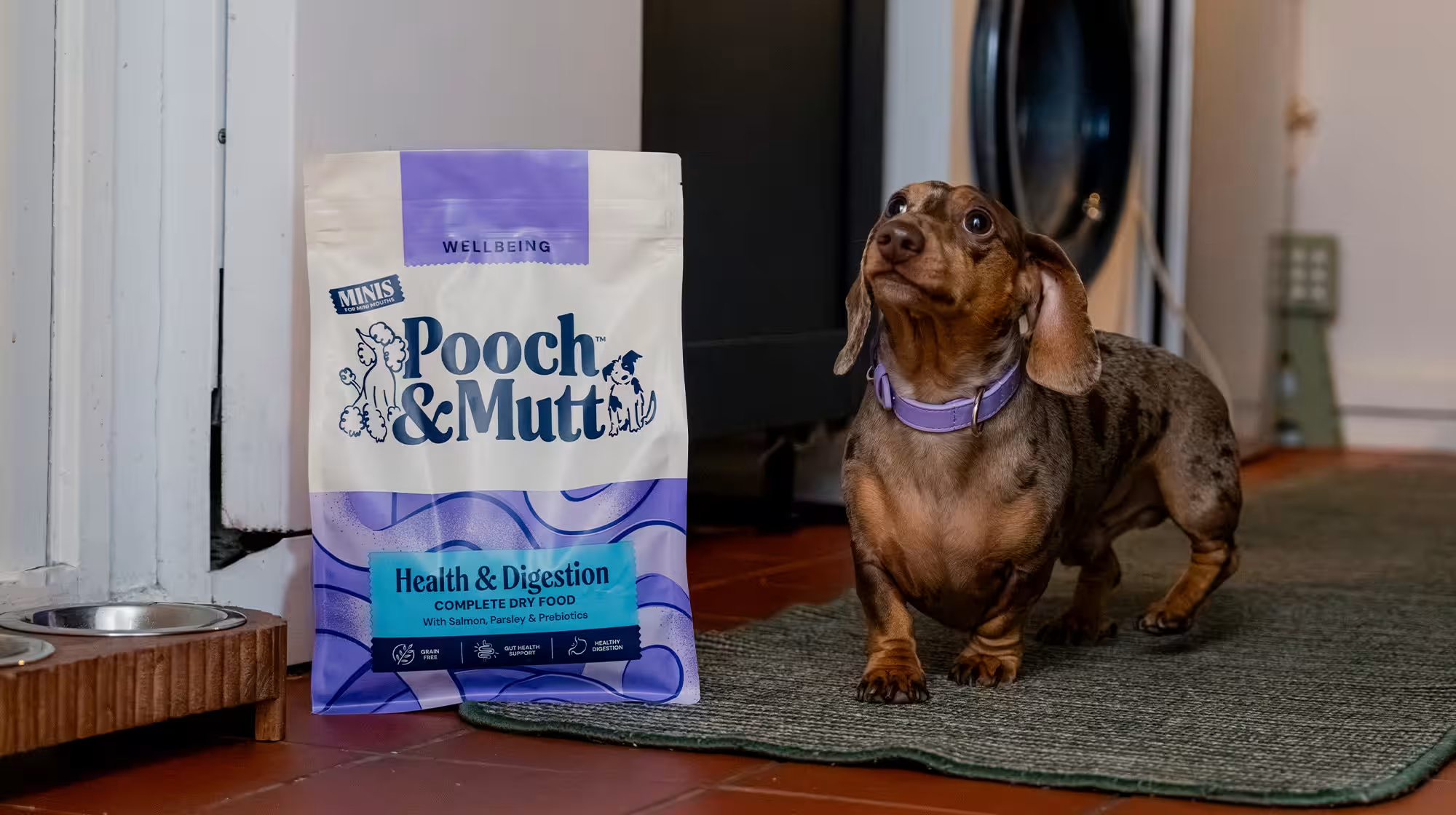Key Takeaways:
- Diet is an integral treatment to manage a dog with colitis, as continuing to feed triggering foods means they’ll keep experiencing bowel issues and diarrhoea.
- Dog food for those with colitis should be high in fibre, easily digestible proteins, low fat, and contain lots of probiotics and prebiotics.
- For dogs with colitis, try and avoid foods that are high in fat and have simple carbohydrates (like that in human food), food with common allergens, and cheap dog food not made for digestive issues
Nutrition is always the best fuel for your dog’s health and happiness, but when they have health conditions that require a specialist diet - such as colitis - it becomes even more important.
If your pooch has ongoing toilet trouble (usually severe diarrhoea) to the extent that they’ve been diagnosed with colitis, one of the first steps in their treatment is to get a special diet in place that works with their delicate digestive system.
So what do you feed a dog with colitis? Read on to learn about the best food to give your pooch for colitis - from what ingredients to avoid, to what constitutes a colitis-friendly diet.
Does diet help manage colitis in dogs?
Diet is an integral treatment to manage a dog with colitis, as continuing to feed triggering foods means they’ll keep experiencing bowel issues and diarrhoea.
Not tweaking their diet can result in serious worsening of their condition, so once your pooch is diagnosed with colitis, it’s a good idea to assess and hone their diet straight away.
Nutritional requirements in dog food for colitis
So what makes a diet suitable for a dog with colitis? These are usually the factors of a colitis-friendly diet for dogs:
High in fibre, as both soluble and insoluble fibres are fundamental in regulating digestion, promoting regular bowel movements and improving stool consistency (no more runny poops!). However, some dogs with colitis may react badly to excessive fibre, so discuss with a vet to be sure you get the balance right.
Easily digestible proteins. Dogs need protein, but they must be lean and easily digested so the body isn’t having to work hard to break them down and absorb them into the body.
Low fat, as fatty foods can also exacerbate the gut, colon and digestive system. Inflammation of the intestines, as happens with colitis, can make fats harder to absorb.
Lots of probiotics and prebiotics, the combination of which have powerful impacts on improving digestion and balancing healthy bacteria in the gut. Here’s more about what probiotics can do for dogs.

What food can I give my dog with colitis?
So what kind of food can you give your pooch to manage their colitis? It’s a personal choice, but you’ll want to discuss one of the following options with your vet:
The easiest option is to choose a premium-quality, specialist dog food for sensitive digestion or gastrointestinal issues. Unlike cheap dog foods on the market, a specialist dog food formulated for gastric health will be made up of tasty, nutritious ingredients that are high fibre and low fat, nourishing your pooch without triggering their sensitive digestive system, and/or colitis.


Gastrointestinal Dry Dog Food
This Gastrointestinal dry dog food is a tasty, grain free, vet-approved recipe to help acute intestinal absorptive disorders, as compensation during maldigestion. It can also be fed during periods of recovery from acute diarrhoea.
-
Veterinary dog food
-
High in fibre
-
Digestible proteins
Current price: £19.99
Gastrointestinal Dry Dog Food
Some pooch parents opt for a homemade diet. This can be the preferable choice if you want to know exactly what goes into your dog’s food bowl, however when your dog has specific dietary needs, it can be tricky to get the nutritional balance right on your own. If you prepare dog food yourself at home, do so with the guidance of a vet or pet nutritionist.
Prioritise hydration. Dogs with colitis are at risk of getting dehydrated - so it’s vital to boost their water consumption. Wet foods help with this, however dry foods for gastrointestinal issues are still a good choice - they can be softened up with warm water or served alongside oral hydration solutions.

Grain-free dog food for colitis
As dogs with colitis can be triggered by common food allergies like grain, lots of pooch parents opt for a specialist grain-free dog food to target the problem. Pooch & Mutt offer a vet-recommended dog food for gastrointestinal issues , such as colitis, that contains zero grain. It comes with the protein goodness of tasty Salmon and Herring, a shot of probiotics and prebiotics to soothe a turbulent gut, and apple pulp for an added boost of dietary fibre.
There are also lots of tummy-sensitive recipes in our Health & Digestion range, which contain gently digestible, high-fibre ingredients such as lean Turkey, White fish and nutritious veggies - along with probiotics and prebiotics, to support dogs with gut and bowel issues such as colitis.


Health & Digestion Dry Food
A specially formulated dry dog food for sensitive stomachs, designed to support digestive comfort and help maintain firm, healthy stools.
-
Prebiotics for gut health
-
Hypoallergenic
-
45% Salmon
Current price: £8.49
Health & Digestion Dry Food
You could also try adding a natural probiotics supplement for dogs to sprinkle on the food you give them for their colitis.
Check with your vet once you’ve decided on your preferred dietary combination.
Ingredients to avoid:
When you’re planning a new diet for your dog with colitis, here’s a reminder of foods to stay away from to avoid more diarrhoea.
High fat foods and simple carbohydrates such as fatty dog treats or most human leftovers, are best completely avoided if your dog has colitis. Sugary, high fat foods put too much pressure on the dog’s digestive system, can make colitis worse, and offer little nutritional value to your dog.
Common food allergens such as grains, red meat or dairy, can irritate a dog’s stomach and digestive tract and exacerbate symptoms of colitis. It’s best to keep it simple with safe, gently digestible ingredients and consider going grain-free.
Cheap dog food not made for digestive issues. It goes without saying, but cheap dog food that hasn’t been designed for sensitive digestive systems is only going to stress your poor dog’s body. These dog foods are not only more likely to contain high-fat ingredients but also preservatives, sugars and nasties that’ll make your dog’s poops much worse.
Transitioning to a colitis-friendly diet
When you’ve organised a diet for your dog’s colitis, it’s important to transition them safely into their new foods.
Gradually introduce their new food. Some pooch parents choose to mix some of their dog’s old food with the new to avoid shocking the digestive system. Eventually, you’ll phase out their old food within 7-10 days.
OR: Identify a food allergen. The other route, if you’re trying to identify a food allergen as the source of your dog’s colitis, is to try an exclusion diet. This means you simplify your dog’s diet to only bland foods and slowly introduce any potential triggers to monitor their reaction. Here’s more detail on identifying a food allergy in your dog.
Check your dog’s behaviour as they transition into their new diet, monitoring bowel movements and any untoward symptoms (lethargy or being bloated for example).
Consult with a vet to update them throughout treatment. They can offer guidance, suggest further diet changes or prescribe helpful medications to make things easier for your dog. Regular check-ups with the vet is an essential factor in managing your dog’s colitis.
Tailor their diet. If you have trouble getting your dog to eat their new foods, that’s another thing to discuss with a vet. Dogs can be picky - but their new diet can be tailored to be palatable to them while still suiting their physical needs.

Conclusion
To sum up, here are the main points to consider when your dog has colitis:
As nutrition is directly linked to digestive health and bowels, it’s vital to put your dog on a suitable diet when they have a colitis diagnosis.
Plan a diet for your dog that’s high in fibre, low in fat and contains simple, highly digestible ingredients. Or you can choose a specialist dog food for gastrointestinal issues or a sensitive stomach that does the hard work of balancing the nutrients for you.
Remember, if you think your dog’s colitis is down to a food allergy, you might want to try an exclusion diet first.
Probiotics and prebiotics are your best friend when managing digestive problems such as colitis - a good dog food for sensitive stomachs should already contain these, or you could use a probiotic supplement for dogs.
Boost your dog’s hydration, either by opting for wet foods, using oral hydration solutions or making sure your pup has the means to drink a lot of water throughout the day.
Get regular vet check-ups as you manage your dog’s colitis; they can offer advice around dietary tweaks or suggest medications to improve your dog’s health and wellbeing.
With veterinary guidance and the help of a specialist diet for colitis, your pooch can avoid exacerbating the symptoms of their condition and enjoy a much improved quality of life.
If your dog has a digestive health condition such as colitis, take a look at our tasty and digestible grain-free dog food for sensitive stomachs , our specialist Veterinary Diets range and powerful probiotic supplements .
FAQs
Can stress affect my dog's colitis symptoms?
Yes it can, in fact stress can even be the sole cause of colitis in some circumstances. If your vet has ruled out any other causes and your dog has been through a stressful event; perhaps a house move, recent surgery or you’ve just got a new pet; it’s possible that stress could be exacerbating your dog’s digestive issues and worsening colitis. Here are some tips on managing stress colitis in dogs.
Is salmon good for dogs with colitis?
Salmon is a healthy, delicious protein full of essential fatty acids like omega-3 and omega-6. However, it can be considered a risky food for dogs with serious digestive issues (pancreatitis, for instance), due to it having a higher fat content than other proteins.
Discuss this over with your vet, however a specialist dog food for digestion that contains salmon should be safe for your dog to eat. If you choose to feed your dog fresh salmon, be sure it’s cooked and plain without added salt, and that all the bones are removed.
What's the difference between IBD and colitis in dogs?
Both Irritable Bowel Disease (IBD) and colitis are conditions that affect digestion and bowel function in dogs, however they are different things. IBD is a general term for inflammation of the entire digestive system, including the gut, small intestine and colon, whereas colitis is specifically linked to the colon. Colitis can be either chronic or an acute, short-term symptom of another illness or infection, whereas IBD is a longer-term condition in dogs that impacts what they can eat and digest.
How long should it take to see improvements after switching to new dog food?
This depends on the severity and causes of your dog’s colitis, but in general, once you’ve transitioned your dog into a new colitis-friendly diet, you should start to see improvements within 2-4 weeks. Keep an eye on their behaviours and bowel movements for signs of improvements on their colitis, and be in touch with your vet throughout the process so they can guide you on next steps.
Are there any supplements that can help support dogs with colitis?
A probiotic supplement is a great option for a dog with digestive issues such as colitis. Probiotics and prebiotics are responsible for balancing the bacteria in the gut and promoting digestion, immunity and healthy bowel function. Dogs can get probiotics from food, but a probiotic supplement for dogs that you can sprinkle over their food is a more targeted way of making sure they get all the probiotic goodness they need.
Should I avoid feeding my dog treats if they have IBD?
All dogs deserve treats, even those with dodgy tummies! The key is choosing dog treats that won’t cause havoc in their delicate tums, which means human leftovers and fatty, sugary treats are a no-no. Try some healthy dog treats made from natural ingredients. Many, such as our probiotic meaty treats, for instance, have added supplements that will actually support your dog’s digestive issues.




